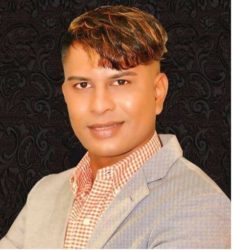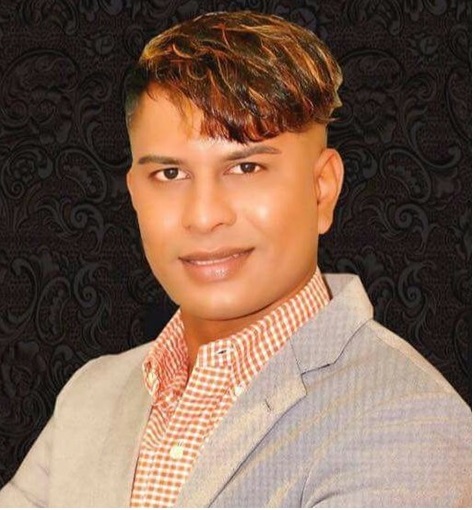Moments before he was set to deliver his ruling on Marcus Bisram’s application to have a murder charge against him withdrawn, Justice Gino Persaud was yesterday afternoon met with a request by the man’s attorneys to discontinue the proceedings.
The matter, which was set for decision at 3pm, was called approximately thirty minutes late at the High Court in Georgetown.
Noticing the absence of Bisram’s lead attorney, Sanjeev Datadin, a visibly-angry Justice Persaud immediately enquired from the junior attorneys Ganesh Hira and Siand Dhurjon, who appear in association with Datadin, the reason for his absence.
Offering an explanation, Hira told the judge that Datadin was attending to another matter at Berbice, where he had to represent another murder accused.
“Mister Datadin had conduct of this matter and I will hear from him,” the judge sternly said. He then asked when Datadin was scheduled to return, while emphasising that he must hear the reasons for his last-minute application to have the matter withdrawn.

Hira said Datadin was not expected back in Georgetown until this afternoon.
An irate Justice Persaud recalled Datadin and Dhurjon visiting his chambers last Friday to discuss their intention to withdraw and discontinue the matter.
Dhurjon confirmed that both he and Datadin were told at that point to put in writing the reasons for their application and to substantiate them with legal authorities.
The judge noted that he had told the attorneys that he knew of no provision in the Civil Procedure Rules (CPR) which allows for the application they were seeking, especially since the matter had been set for ruling.
Notwithstanding this, the judge said he, however, told Datadin and Dhurjon to email him over the weekend with whatever arguments they intended to rely on, along with their authorities.
Justice Persaud said that he had received no correspondence from Datadin, and expressed shock at the notice received from Dhurjon before the case was called about their intention to withdraw and discontinue the matter.
The judge said that the application before him clearly suggested that Datadin never intended to lay over submissions to the court nor authorities to back his position.
In a bid to offer a response on behalf of his senior, Dhurjon, who conceded that the CPR does not support their application, told the judge that the application was precipitated by certain developing events although he did not go into detail as to what these were.
Pressed for reasons why the correspondence requested was not sent, Dhurjon told the judge he could not say why Datadin did not comply, but added that the application was in the “best interest” of their client.
According to the judge, he had told Datadin and Dhurjon to also ensure that whatever correspondence they were forwarding to him be copied to the Solicitor-General, who is representing the Director of Public Prosecutions (DPP), the Commissioner of Police and the Chief Magistrate, who are all listed as respondents.
Incensed, the judge said he found it “troubling” that Datadin defied his order to send the email.
Asked whether she had received notice, Solicitor General Kim Kyte-John said she did not. As a matter of fact, Kyte-John said she saw only a digital photograph of the notice on a cellphone.
She argued that even that notice of withdrawal was not properly before the court as it was a withdrawal against only the DPP, when it should be directed to all three respondents.
In the circumstances, Kyte-John asked that the application be struck out and that substantial costs be imposed upon the applicant for wasting the court’s time and state resources.
Kyte-John asked the court to proceed with its ruling, while noting that she found the lawyers’ application “to be very strange.”
Justice Persaud noted that he had put aside time to deliver his ruling, having already listened to all arguments and going through the affidavits in the matter.
“Isn’t there some abuse of process to come now, on the day of ruling, to ask that this matter be withdrawn and discontinued,” the judge asked Dhurjon, who would only say they were acting in their client’s interest.
He said he tried to expedite the case by giving only short adjournments and noted that it is unacceptable when all that is left is the delivery of the ruling for counsel to now say they are withdrawing the matter.
Lifting a thick pile of submissions Datadin had previously tendered to the court, the judge asked whether he had wasted his time reading the files, while stating that he had other important matters to attend to as well. The judge said that since being appointed to the Bench earlier this year, he was assigned 100 cases dating as far back as 2008 and he noted the backlog issues plaguing the judiciary as well.
According to Dhurjon, Friday was the earliest they could have discussed their initial intention to have the matter discontinued with the judge.
“I will like Mr. Datadin to be here. Mr. Datadin can’t do this to me. I will not allow him to abuse the process of this court. I want to hear him on this issue,” Justice Persaud said.
Noting that Datadin is the Captain of the Bar Association’s cricket team, the judge sent Dhurjon with a message to his senior, to appear before him prepared at 1.30 this afternoon with “gloves, pad, bat and ball.”
Bisram, a United States-based Guyanese, is currently in a US jail awaiting extradition to Guyana, where he has been named a co-defendant in the murder of Number 70 Village carpenter Faiyaz Narinedatt.
Earlier this month, he lost his challenge to the extradition, when US Judge Peggy Kuo ordered that he be sent back to Guyana to face the charge here, effectively thwarting his bid to stay her hands as they sought to have the murder charge dismissed in the High Court here.
Datadin had argued that the charge is “without legal foundation, null, void, unreasonable and unfair.”
According to him, the only evidence which the state purports to have against his client is a statement from its key witness, Chaman Chunilall, alleging to have heard Bisram saying words to the effect, “kill him.”
During the preliminary inquiry (PI) into the charge against Bisram’s five co-accused, before Magistrate Charlyn Artiga at the Springland’s Magistrate’s Court, however, Chunilall, under cross-examination, purportedly recanted his story.
As a result, Datadin argued that the recantation is sufficient to warrant the DPP to withdraw the charge levelled against Bisram.
Datadin has argued that the witness could not have known what the police claims he said in his statement, as he cannot read nor write, and he suggested that the man’s denial of having knowledge of the murder was omitted from his statement.
Kyte-John, however, has refuted Datadin’s contention that the purported recantation should be a reason to withdraw the charge against the accused, arguing that these are issues which the magistrate is called upon to examine and determine at the conclusion of the PI, whether a prima facie case has been made out to commit the defendant to stand trial before the High Court.
Police here have alleged that Bisram procured and commanded Orlando Dickie, Radesh Motie, Diodath Datt, Harri Paul Parsram, and Niran Yacoob to murder Narinedatt between October 31 and November 1, 2016, at Number 70 Village, Berbice.






